EY refers to the global organization, and may refer to one or more, of the member firms of Ernst & Young Global Limited, each of which is a separate legal entity. Ernst & Young Global Limited, a UK company limited by guarantee, does not provide services to clients.
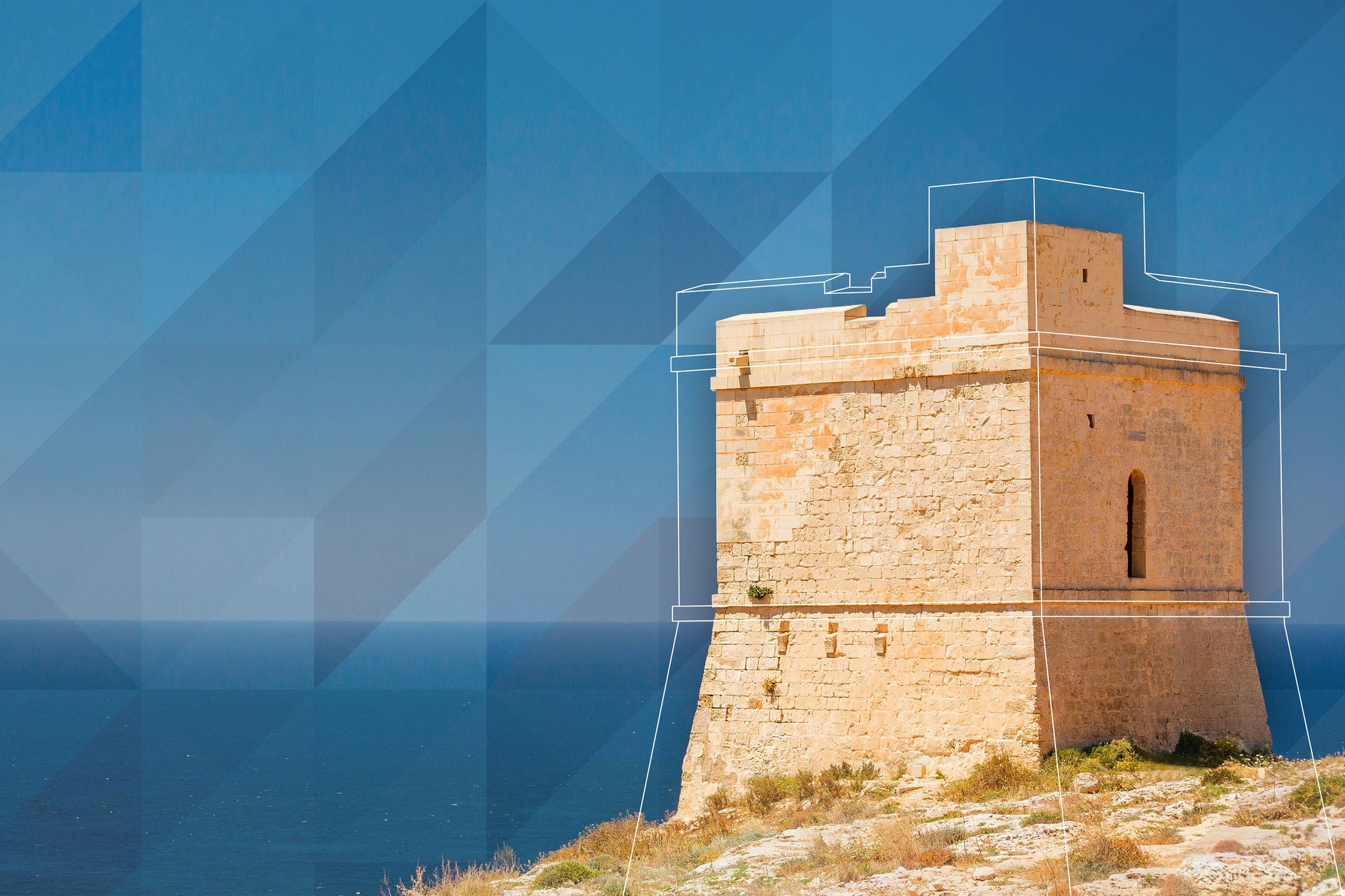
EY Malta has released the findings of its 20th Malta Attractiveness Survey during the Future Realized Conference on 23/10. This annual study, which gathers insights from existing foreign direct investment (FDI) companies in Malta, provides a comprehensive overview of the island's investment appeal and areas for improvement. Click on Malta Attractiveness Survey 2024 to download the full report.
Attractiveness Index
54% percent of existing FDI investors considered Malta to be an attractive location in this latest study. Although this represents a slight decrease of 5% from the previous year, it is wella above the low point reached in 2021. Yet it does not match the high confidence levels Malta enjoyed up to the year 2019.
Investors acknowledge the strategic advantages that Malta offers but also recognize that there are pressing challenges that need to be addressed. These include the rising cost of living and the strain on the labor market, which could potentially impact the country's ability to sustain long-term growth and retain its attractiveness for FDI.
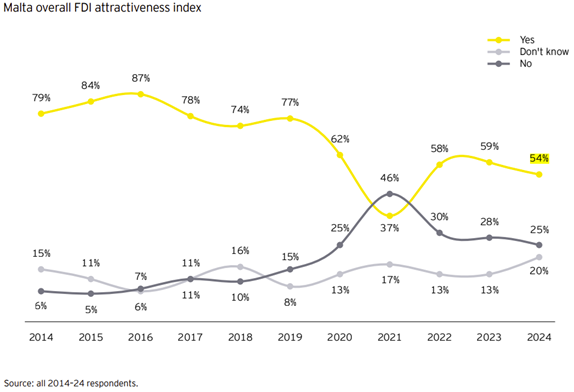
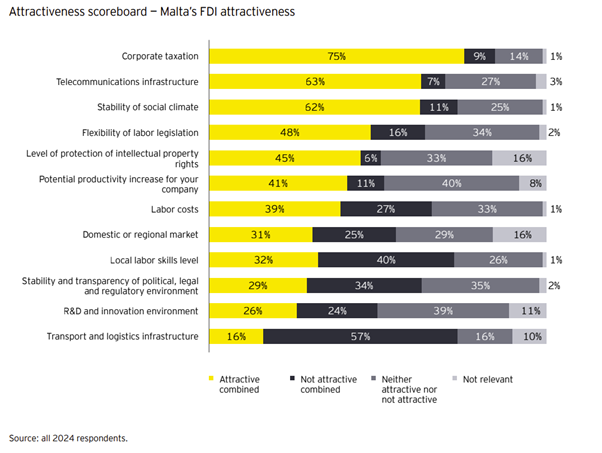
Continuing the trend from previous years, Malta's corporate taxation is still the leading factor in its FDI attractiveness, with 75% of respondents acknowledging it as a pivotal aspect of their investment decision.
Following corporate taxation, Malta's telecommunications infrastructure is recognized by 63% of investors as a considerable benefit, underscoring the country's expanding influence as a hub for the digital economy. The emphasis on robust connectivity is especially vital for key sectors such as finance, gaming, and technology, which are integral to Malta's economic framework.
On the other hand, the level of labor costs and skills is perceived to be attractive by only 39% and 32% of respondents respectively. . The stability and transparency of the political, legal and regulatory environment is third from the bottom on the attractiveness index.
Transport and logistics infrastructure continues to be an area of concern, with only 16% of investors viewing it positively, a further decline from the previous year. Research and Development (R&D) and innovation, although marginally better at 26%, remain at the lower spectrum of the attractiveness scoreboard.
Biggest Risks Facing Malta’s FDI Attractiveness
The evolving international tax landscape and the scarcity of skilled labor continue to dominate as the principal risks to Malta's FDI allure, with each concern being flagged by 50% of respondents. Reputational risks have notably risen in prominence, now considered a significant threat by 42% of investors. This increase is indicative of a heightened emphasis on the importance of transparency and good governance practices, highlighting the critical need for Malta to uphold and enhance its regulatory framework to maintain investor confidence.
Cost competitiveness and the state of the physical national infrastructure are also among the concerns that follow closely behind, at 34% and 29%, respectively. The survey paints a picture of an investment community that is aware of Malta's enduring economic potential, yet equally aware of the emerging risks that could potentially alter its course.
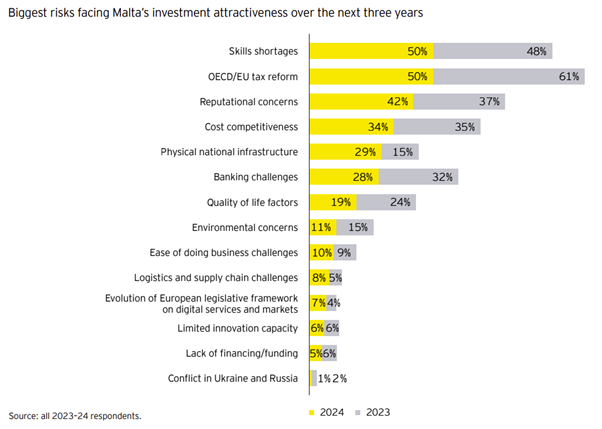
Presence in Malta in 10 Years’ Time
In an era marked by rapid economic and geopolitical changes, projecting the long-term presence of companies in any location is a complex task. Nonetheless, the investment community in Malta exhibits a resilient outlook, with a substantial 70% of FDI companies confirming their intention to sustain their presence on the island for the next decade. This figure represents a slight increase from the previous year.
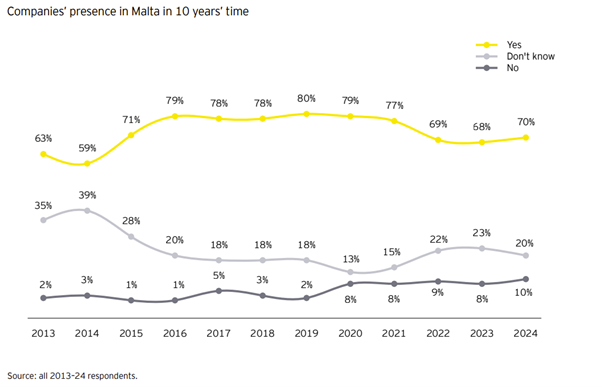
Expansion Plans
This confidence is complemented by tangible growth plans, as over one-third of investors are preparing to expand their operations in Malta. Investor commitment to growth within Malta remains positive, with 38% of companies planning to expand their operations over the next year. This figure indicates a modest increase from the previous year's 36%, highlighting a steady, but cautious, investment climate. The current percentage of companies with expansion plans is still lower compared to the more robust post-pandemic recovery period of 2022, which saw 46% of investors looking to expand.
This continuity in expansion sentiment, despite not reaching the heights of a few years ago, suggests that while investors remain optimistic about Malta's business environment, they are also mindful of the broader economic context and its potential impact on their growth strategies.
Priorities to Remain Globally Competitive
To sustain and enhance Malta's position in the competitive global arena, investors have identified key areas of focus for the coming decade. Infrastructure, transportation, and planning, alongside education and skills development, are at the forefront, with each area being prioritized by 46% of respondents.
Long-term economic planning is also emphasized, with 37% of investors highlighting its importance. This underscores the need for strategic foresight and the development of sustainable economic policies that can navigate the complexities of the global market and support Malta's growth. The alignment of these priorities indicates a comprehensive approach where investors believe that Malta must invest in both its physical and human capital to remain competitive.
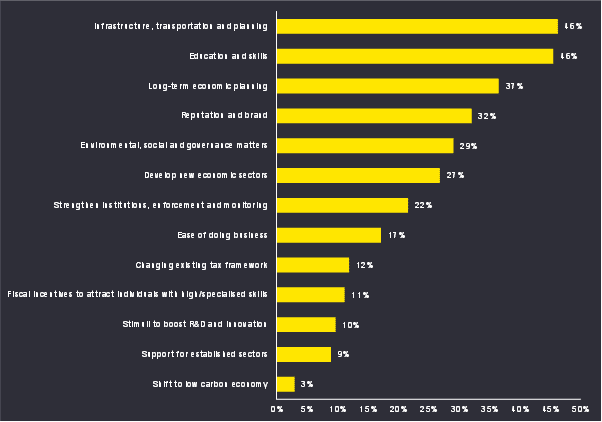
Malta’s Progress on Sustainability Related Factors
Malta's investment landscape is increasingly being viewed through an environmental lens, with government support and eco-friendly infrastructure becoming more prominent in the eyes of investors. In 2024, a significant 62% of investors recognize the importance of green infrastructure as integral to their long-term investment strategies, marking a 5% increase from the previous year when considering top priorities alone.
This positive shift indicates that Malta's environmental strategies are not only pivotal to its present appeal as an investment destination but are also essential to its sustained attractiveness for future foreign direct investment. The emphasis on eco-friendly systems underscores the growing trend among investors to align their business objectives with sustainable practices.
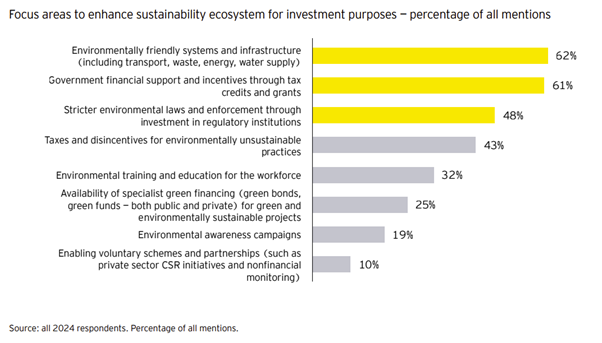
Technology and AI Related Factors Attractiveness Compared to Other European Countries
Malta's technological landscape is increasingly recognized for its competitiveness within Europe. 46% percent of respondents consider Malta's IT capabilities on par with other European countries, and 17% even view Malta as more attractive, indicating a positive perception of Malta's tech environment. However, 28% of respondents feel that Malta lags behind, which highlights areas for potential improvement in a rapidly evolving tech sector.
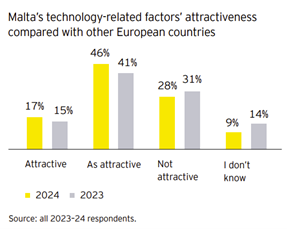
Artificial Intelligence (AI) leads the way as a key area of interest for investors, with many also looking to invest in cloud technologies and intelligent automation as drivers for future growth. Forty-five percent of respondents regard intelligent automation as a crucial component of their investment strategy, while 33% are focused on leveraging distributed cloud solutions. These technologies are seen as enablers for businesses to enhance efficiency, reduce costs, and improve adaptability.
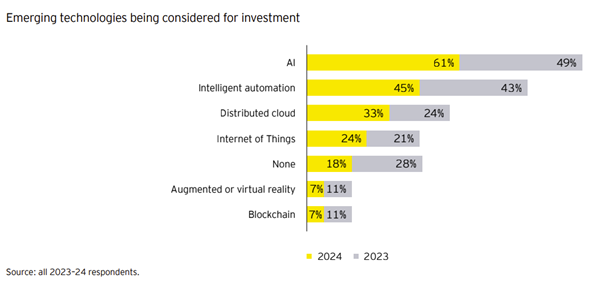
By embracing these innovations, Malta can position itself as a hub for innovative technologies that appeal to a wide range of industries, from FinTech and gaming to health care and education. Respondents also clearly believe that secure and resilient international connectivity has an exceedingly high impact on business operations, greater than the availability of high-speed internet, which is considered to have an extremely high impact by half of the respondents.
Infrastructure Planning for Population Growth
The adequacy of Malta's infrastructure in relation to its current and future population remains a significant concern among investors. In 2024, a substantial 70% of respondents view Malta's infrastructure as inadequate for supporting the anticipated expansion of its population. An additional 19% perceive the infrastructure planning and development as neither adequate nor inadequate, signaling a sense of uncertainty or ambivalence about the country's readiness.
The consensus among investors is clear: there is a pressing need for Malta to enhance its infrastructure across all sectors. The growing demands of a rapidly expanding population and economy are exerting considerable pressure on existing systems, highlighting the urgency for comprehensive and forward-thinking infrastructure development.
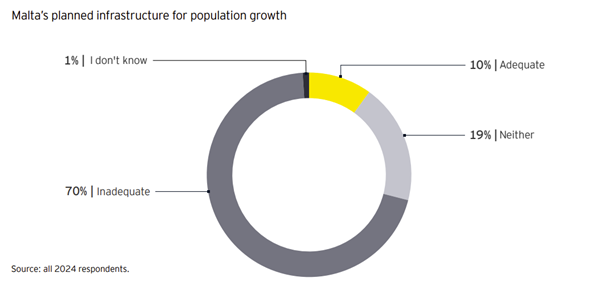
Skills Challenges
The recruitment and retention of specialized personnel in Malta continue to be influenced by several critical factors, with the cost of housing and living emerging as the primary concern. Over half of the respondents (51%) cite the excessive cost of living as a major obstacle to attracting and retaining international talent, particularly for roles requiring specialized skills. The housing market poses a significant challenge for both expatriates and local talent, creating a barrier to filling essential positions.
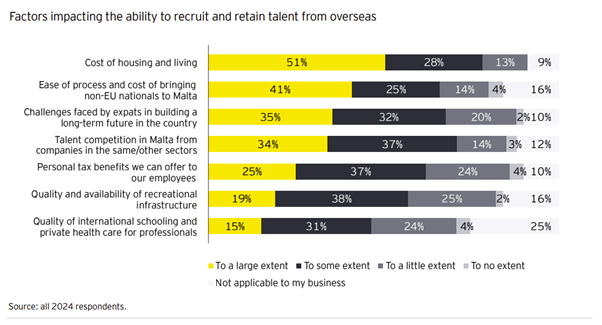
Challenges to find the required specialized skills persist. For a number of years, Malta’s skill supply has been unable to keep up with the increasing demand for specialized (and other) skills. This year, sixty-nine percent of this year’s cohort reported not being able to find the required specialized skills in the local labor market.
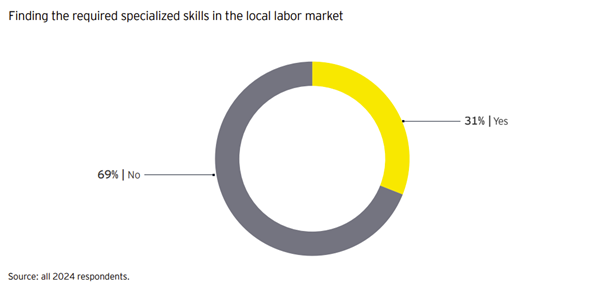
View from EY Malta
In his opening address at the Malta Future Realized Conference, Ronald Attard, EY Malta Country Managing Partner, reflected on the island's transformation and its journey over the past two decades. "Twenty years ago, Malta’s official population stood at just over 400,000. Today, that number is close to 540,000," he noted, highlighting the significant growth in both population and economic output, with GDP rising from US$6 billion in 2004 to over US$20 billion now.
Attard addressed the fluctuating attractiveness of Malta for FDI, acknowledging a recovery from the lows of 2019–21, but also a slight dip in attractiveness this year. "Telecommunications infrastructure has been a resounding constant positive over the years," he stated, while also pointing out that other previously attractive criteria have lost their appeal.
"The stability of social climate has scaled down from the peaks experienced when we started undertaking our research," Attard remarked. He emphasized the challenges posed by increased labor costs and the need for a stable political, legal, and regulatory environment, which, despite improvements, still fall short of the highs from a decade ago.
Attard remarked that “Leveraging Malta’s strengths in telecommunications infrastructure and technology, not least the significant skills base on the island built through the growth of the gaming industry, may be part of the answer. Last year, we referred to calls from a number of groups for an adjustment or change to the island’s economic model, to one that emphasizes substantial, tangible improvements in infrastructure, the labor market and holistic economic sustainability beyond mere numerical growth. And those calls are more pronounced this year.”
Looking ahead, Attard commented on the need for infrastructure and education investment, with various respondents also emphasizing long term economic planning. "Against this background of economic growth, we are losing ground in two of the most fundamental areas that potential investors assess — workforce skills and availability, as well as stability of the political and regulatory environment," he said.
Despite the challenges, Attard revealed a positive outlook among investors, with 70% believing they will still be in Malta in 10 years. He identified tourism and technology, including gaming, AI, and FinTech, as key areas identified by respondents for Malta's future. "Technology is viewed as the major driver for change, overtaking sustainability," he said, adding that the availability of necessary skills is also considered more important than government support by the FDI community.
Attard concluded by emphasizing the importance of engaging with innovative technologies and making strategic choices to manage growth efficiently. "We will, during the forthcoming year, continue the debate through specific sessions focused on build, share, engage, change, and generate to support Malta in preparing to face the challenges brought about by rapid growth, as well as the opportunities that changes in technology provide".


